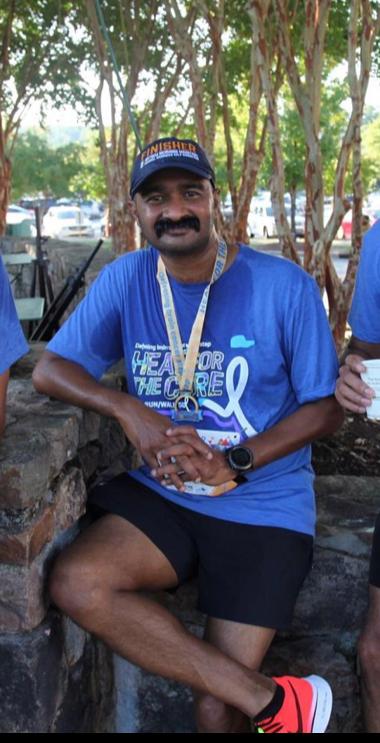
Deepak Musale of Cary, North Carolina, knows this challenge firsthand. Musale, 45, was diagnosed last July with glioblastoma multiforme, a highly aggressive brain cancer. At the time, he was training for the 2019 New York City marathon. It was during a run in early July that he noticed his left hand had become numb. It didn’t concern him enough to stop the run, but he did schedule an appointment with his physician. The symptoms were more pronounced after a lunchtime walk at work July 19. He felt weakness on his left side and had notable stomach discomfort. This prompted Musale, an information technology professional in Durham, North Carolina, to go to his car and call his office. The employee health team responded and took him to the emergency room. An MRI scan detected a mass on the right side of his brain. Musale had surgery July 26 at UNC Rex Hospital, followed by a six-week course of radiation therapy and chemotherapy at the North Carolina Cancer Hospital, the clinical home for UNC Lineberger Comprehensive Cancer Center. Running a marathon On Nov. 3, less than a month after completing his treatment, Musale ran the New York City Marathon. He finished the race in 4 hours and 34 minutes, but his time was slower than he’d hoped. Musale said he was running well for the first 16-17 miles when he realized he forgot to take his anti-seizure medication. He decided it was best to slow his pace to and focus on drinking water more frequently. Still, he crossed the finish line ahead of nearly 25,000 other runners. Simon Khagi, MD, Musale’s neuro-oncologist, said he was struck by Musale’s determination to run the New York City Marathon and his stamina during treatment to maintain his training regimen. “His resilience is remarkable and a testament to the human spirit,” said Khagi, the director of the neuro-oncology and brain metastases program at UNC Lineberger and an assistant professor of neurosurgery and medicine. “When we met to discuss his treatment plan, he was in the process of training for the New York City Marathon, which I did not expect him to continue. He not only continued to train, he also ran two half marathons and the Head for the Cure 5K.” Musale initially wasn’t sure whether he should continue to train for the marathon following his surgery. After an online search, he learned of others with brain cancer who ran half and full marathons. This was the motivation he needed to start running again.